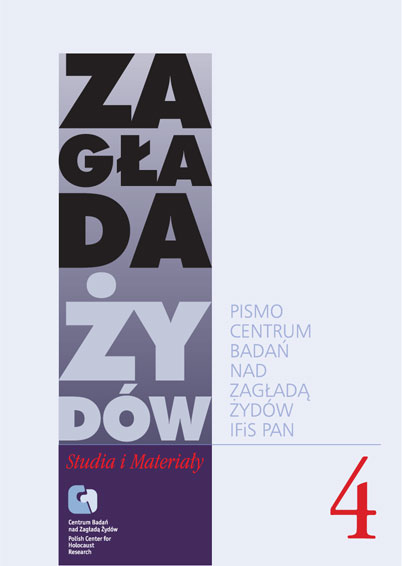Not only about “Fear”. The psychology of the common understanding of history
Zagłada Żydów. Studia i Materiały, No. 4 (2008), Pages: 517-526
Submission Date: 2020-10-15Publication Date: 2008-11-02
 https://doi.org/10.32927/ZZSiM.288
https://doi.org/10.32927/ZZSiM.288
Abstract
Publications on the Holocaust and the history of Polish-Jewish relations quite frequently lead to historical debates in the Polish media. On the one hand, it is a unique opportunity to publicise unknown pages of history, and on the other, a potential threat to contemporary Polish-Jewish relations. This article is an attempt to explain the Polish reactions to Jan Tomasz Gross’s Fear and the character of similar debates in Polish media. Thanks to the achievements of experimental social psychology (attribution errors, social identity theory, and the sleeper effect), we can now understand why certain books spawn a media debate while others do not; why the contents of the contested books reach the consciousness of a broader audience and why the debates that surround such books less and less resemble true discussion, in which people cease to talk to one another and engage in polemics against the position of their opponents.
License
Copyright (c) 2008 Author&"Holocaust Studies and Materials"

This work is licensed under a Creative Commons Attribution 4.0 International License.
https://creativecommons.org/licenses/by/4.0
The journal is published under the Diamond Open Access Standard, CC-BY-4.0 Deed - Attribution 4.0 International - Creative Commons
Most read articles by the same author(s)
- Michał Bilewicz, Karolina Marcinkowska, The social psychology of the Holocaust: from naive situationism to understanding the role of ideology , Zagłada Żydów. Studia i Materiały: No. 20 (2024)
- Marta Witkowska, Michał Bilewicz, Will the Truth Set Us Free?. Breaking the resistance in the education about Holocaust , Zagłada Żydów. Studia i Materiały: No. 10 (2014)
Similar Articles
- Gabriel Finder, The Trial of Shepsl Rotholc and the Politics of Retribution in the Aftermath of the Holocaust , Zagłada Żydów. Studia i Materiały: No. 2 (2006)
- Małgorzata Melchior, The Holocaust and Polish-Jewish Relations in Sociological Studies , Zagłada Żydów. Studia i Materiały: 2008: Holocaust Studies and Materials
- Jacek Leociak, Understanding the Holocaust. A Task for Generations , Zagłada Żydów. Studia i Materiały: 2008: Holocaust Studies and Materials
- Karolina Panz, The Destruction of shtetl Grice , Zagłada Żydów. Studia i Materiały: No. 3 (2007)
- Natalia Aleksiun, When Fajga Left Tadeusz. Wartime Relationships of Survivors after the Holocaust , Zagłada Żydów. Studia i Materiały: No. 17 (2021)
- Natalia Aleksiun, Historiography of the Holocaust on the Polish-Jewish relations in Poland , Zagłada Żydów. Studia i Materiały: No. 1 (2005)
- Aleksandra Bańkowska, Between responsibility and powerlessness, generosity and temptation. Social care workers in the Warsaw ghetto in the face of their charges and petitioners , Zagłada Żydów. Studia i Materiały: No. 20 (2024)
- Michał Głowiński, Błoński’s Essay Years Later , Zagłada Żydów. Studia i Materiały: 2008: Holocaust Studies and Materials
- Editors Journal, Jan Grabowski, From the editors , Zagłada Żydów. Studia i Materiały: 2010: Holocaust Studies and Materials
- Klaus Peter Friedrich, Nazi Murder on the Jews in Polish Communist Press (1942–1944) , Zagłada Żydów. Studia i Materiały: No. 2 (2006)
1 2 3 4 5 6 7 8 9 10 11 12 13 14 15 16 17 18 19 20 21 22 23 24 25 26 27 28 29 30 31 32 33 34 35 36 37 38 39 40 41 42 43 44 45 46 47 48 49 50 > >>
You may also start an advanced similarity search for this article.
 English
English
 Język Polski
Język Polski



 https://orcid.org/0000-0001-5027-1691
https://orcid.org/0000-0001-5027-1691





